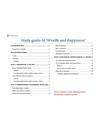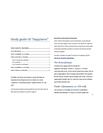Paper om "Wealth and happiness"

- STX 3.g
- Engelsk B
- 12
- 4
- 1751
Eksempelbesvarelse: Paper om "Wealth and happiness"
Her finder du Studienets eksempelbesvarelse af A-opgaven "Wealth and happiness" fra eksamen august 2011 for Engelsk B.
I besvarelsen har Studienets fagredaktør i engelsk lavet kommentarer til hver delopgave, hvori afsnittenes indhold, opbygning og metode forklares. Du kan bruge eksempelbesvarelsen som inspiration til, hvordan du kommer i gang med din egen opgave. Du kan også bruge den som et godt eksempel på, hvordan man besvarer opgaverne i en paper.
Opgaveformulering
1. Give an outline of the views on the relation between wealth and happiness presented in texts 1 and 2.
2. How does David Brooks engage the reader in text 1? Give examples from the text.
3. Based on the opinions voiced in texts 2 and 3, discuss whether spending makes people happy.
Uddrag
1.
The views on the relation between wealth and happiness presented in texts 1 and 2 differ slightly, as the authors approach the subject from different angles. The main argument presented by David Brooks in text 1 is that money doesn´t make us happier. Brooks contrasts social relations, exemplified by a well-functioning marriage, with having a career and lots of money. He argues that personal relations are far more important than any amount of money. According to Brooks, poor people are the only ones who can actually gain considerable happiness from an increased income. Once we have enough to get by, we stop being positively affected by the size of our paycheck.
...
2.
In text 1, David Brooks makes use of different strategies to engage the reader. First of all, he starts off with a teaser to catch the reader´s interest, “Two things happened to Sandra Bullock this month…” (txt1, l. 1). By choosing a hot topic that has general interest he is sure to capture a large audience. He only later reveals the purpose of this little introduction. Brooks then chooses to engage the reader by asking a lot of personal questions directly pointing at the reader, “Would you take that as a deal?”, “Would you exchange a tremendous professional triumph for a severe personal blow?” (txt1, ll. 3-4). This gives the reader the feeling that the content is relevant to her/him personally. The next important step is that Brooks draws on research to back up his own views, thus adding a sense of credibility, which will hold the attention of many readers, “This isn't just sermonizing.
...
3.
It is hard, if not impossible, to give a straight answer to the question, “Does spending make us happier?”. This fact is also evident in texts 2 and 3, where two journalists each try to arrive at a conclusion, but naturally end up with more questions than answers. Rosenbloom argues that it matters greatly how we spend our money and that most people will find longer-lasting satisfaction in experiences rather than in things. I tend to agree with her, just as I think most people will. This, however, is not the same as claiming that money has absolutely no influence on our happiness. Surely money cannot buy happiness, but it can ... Køb adgang for at læse mere Allerede medlem? Log ind


